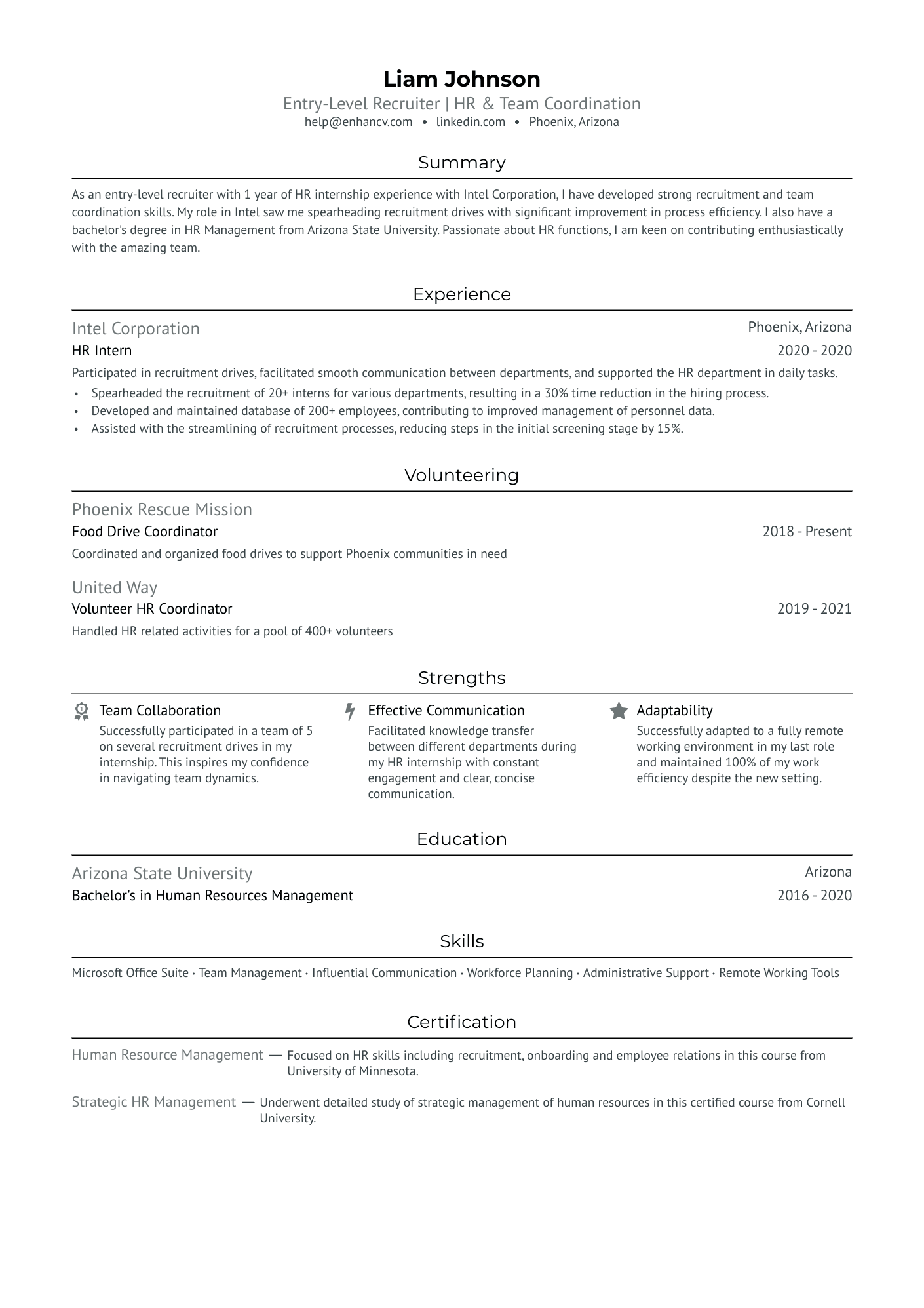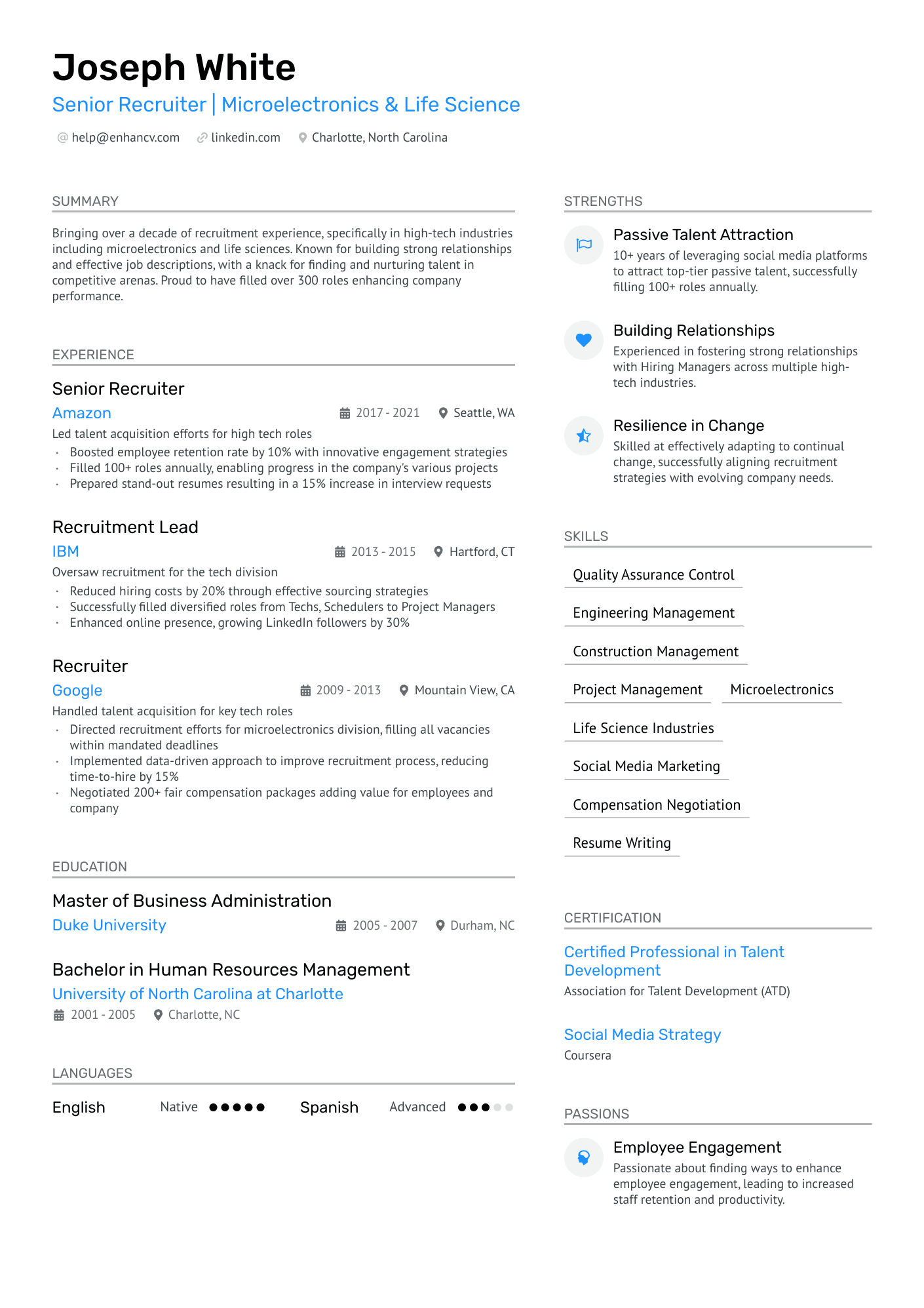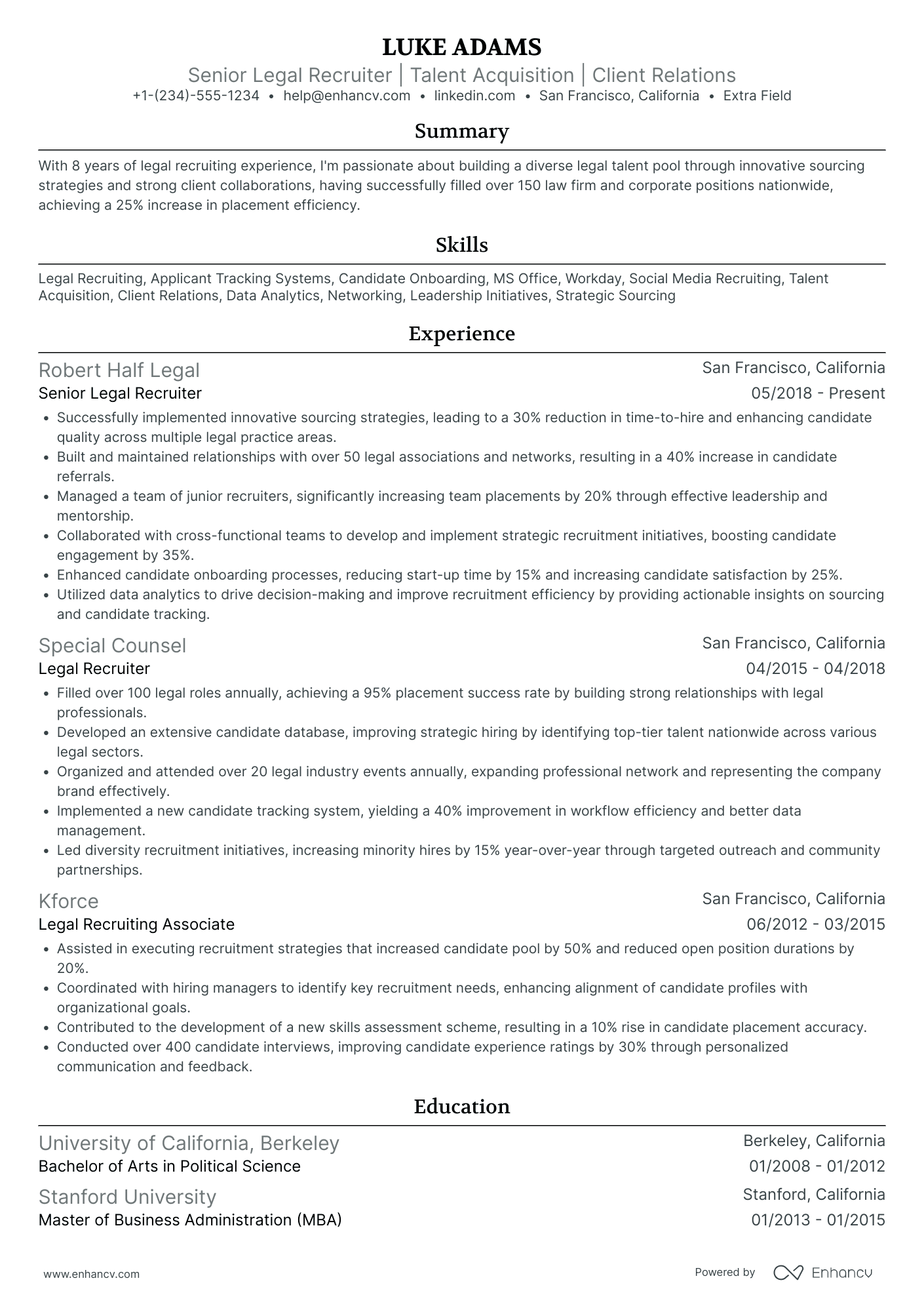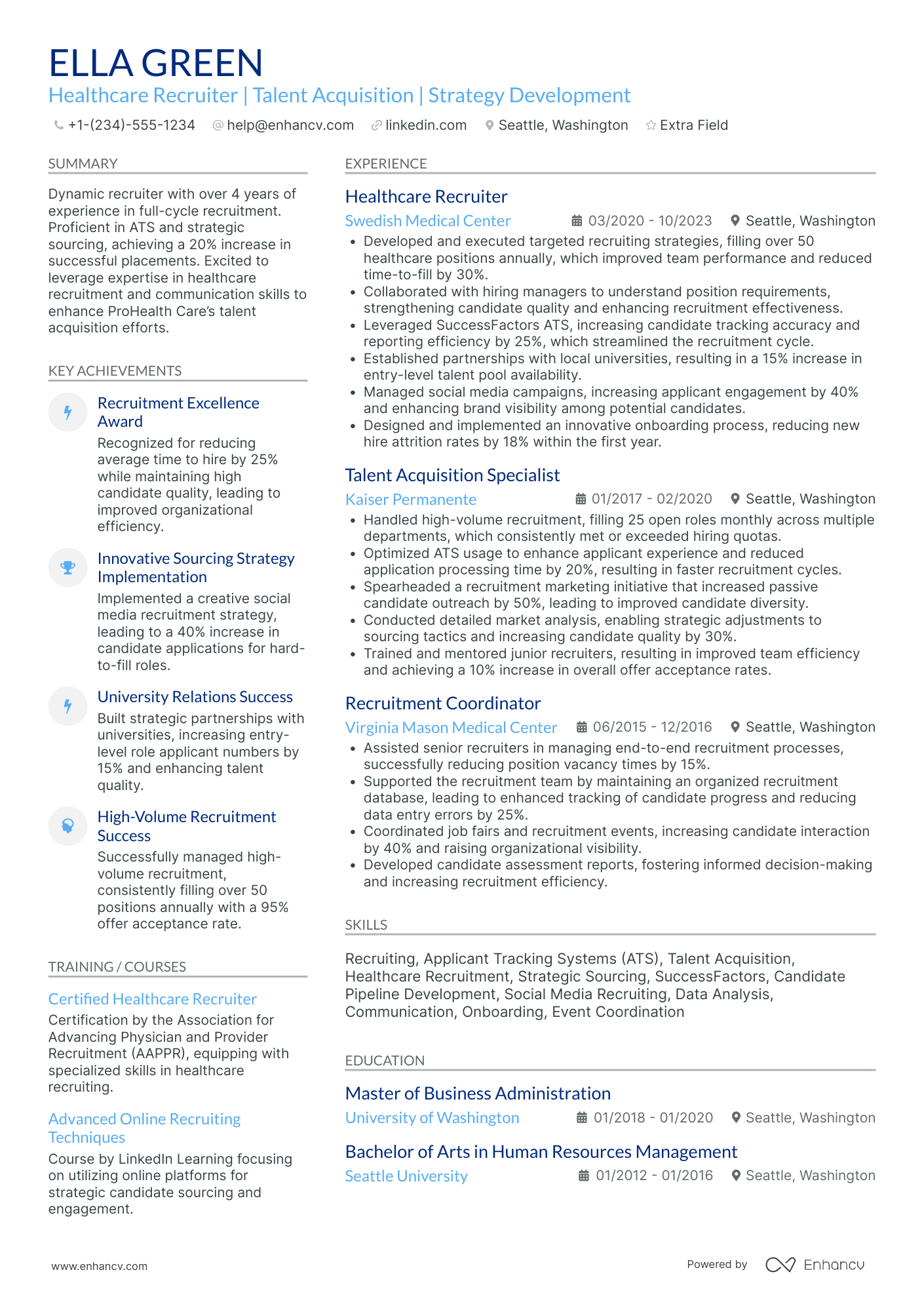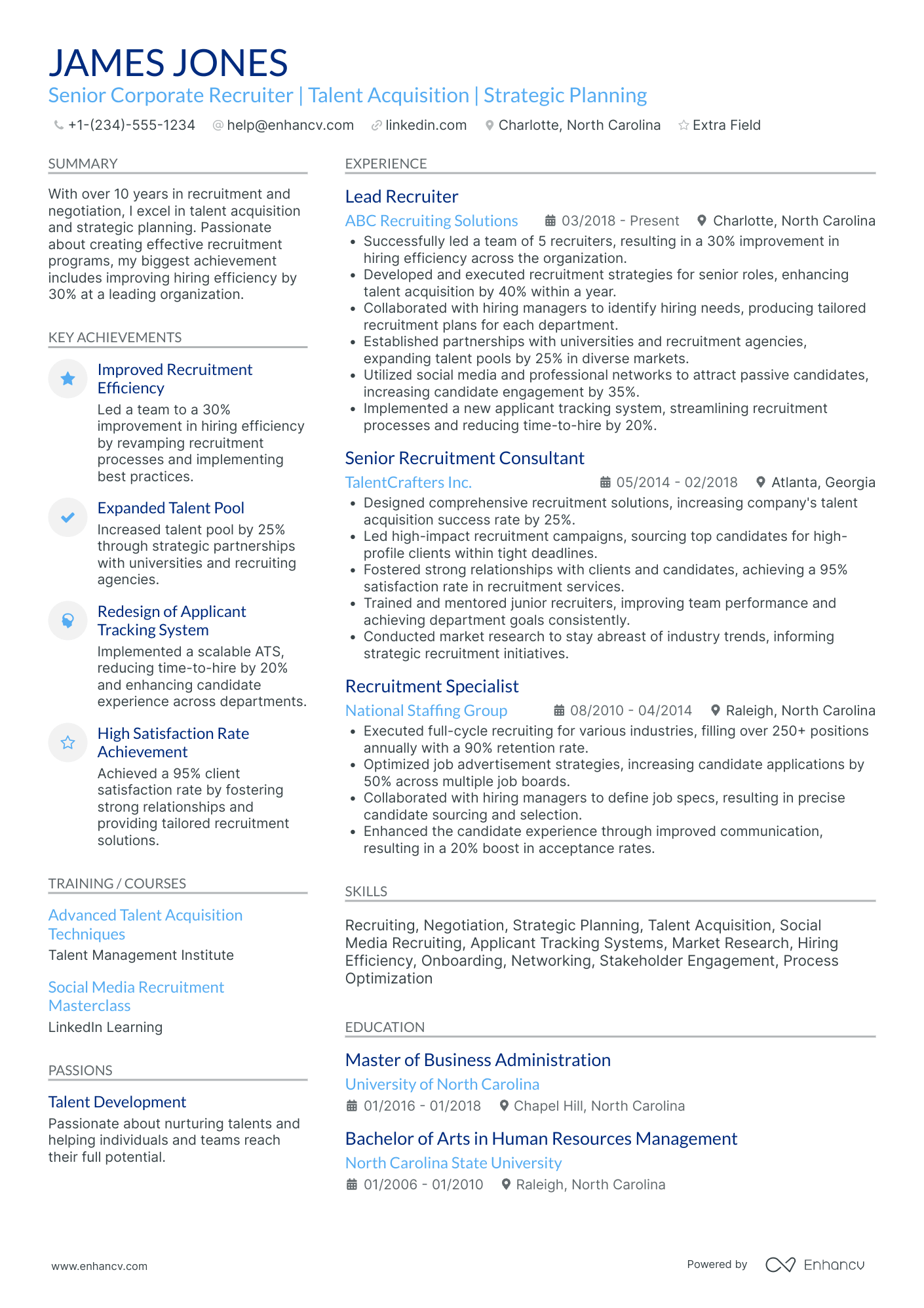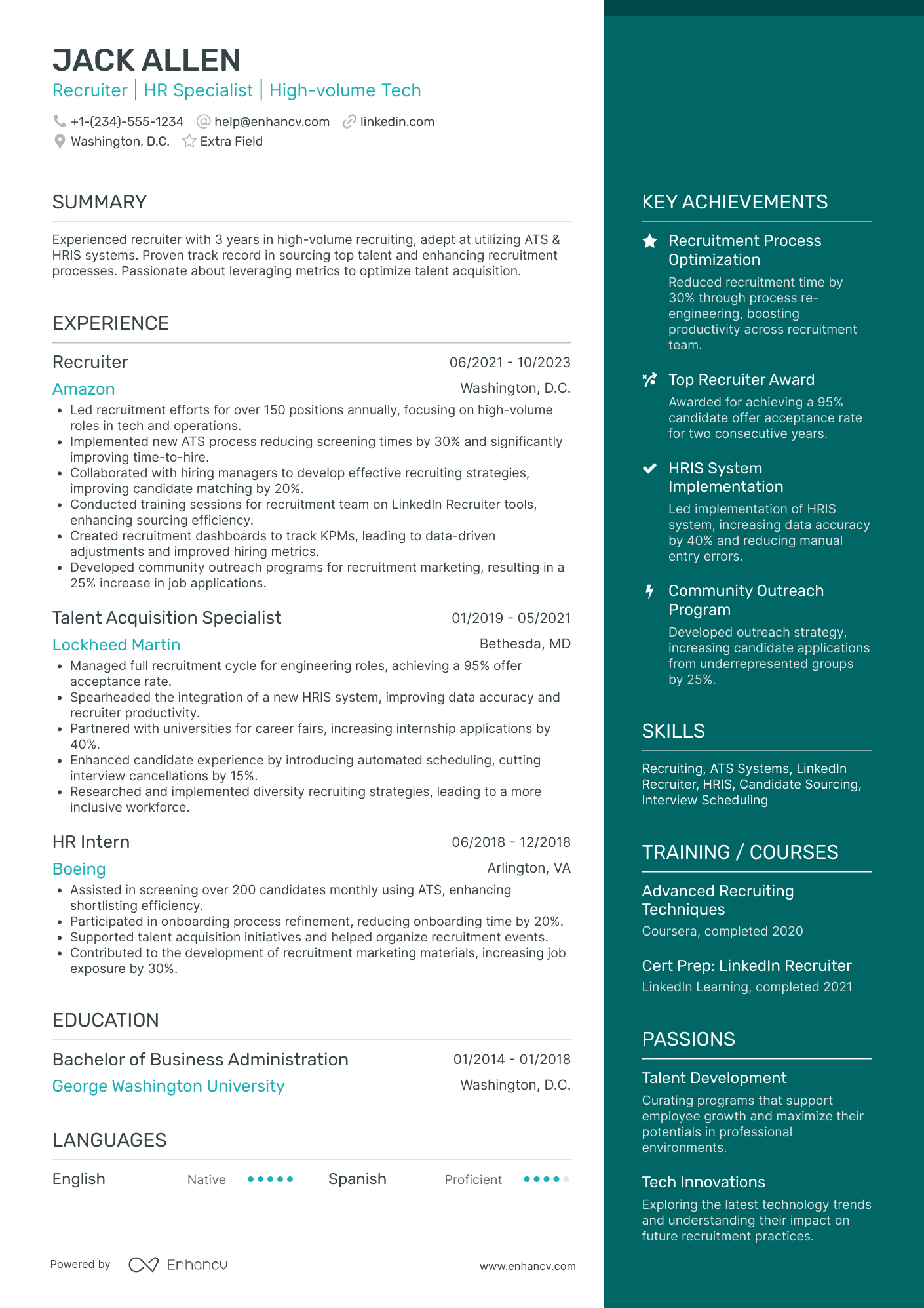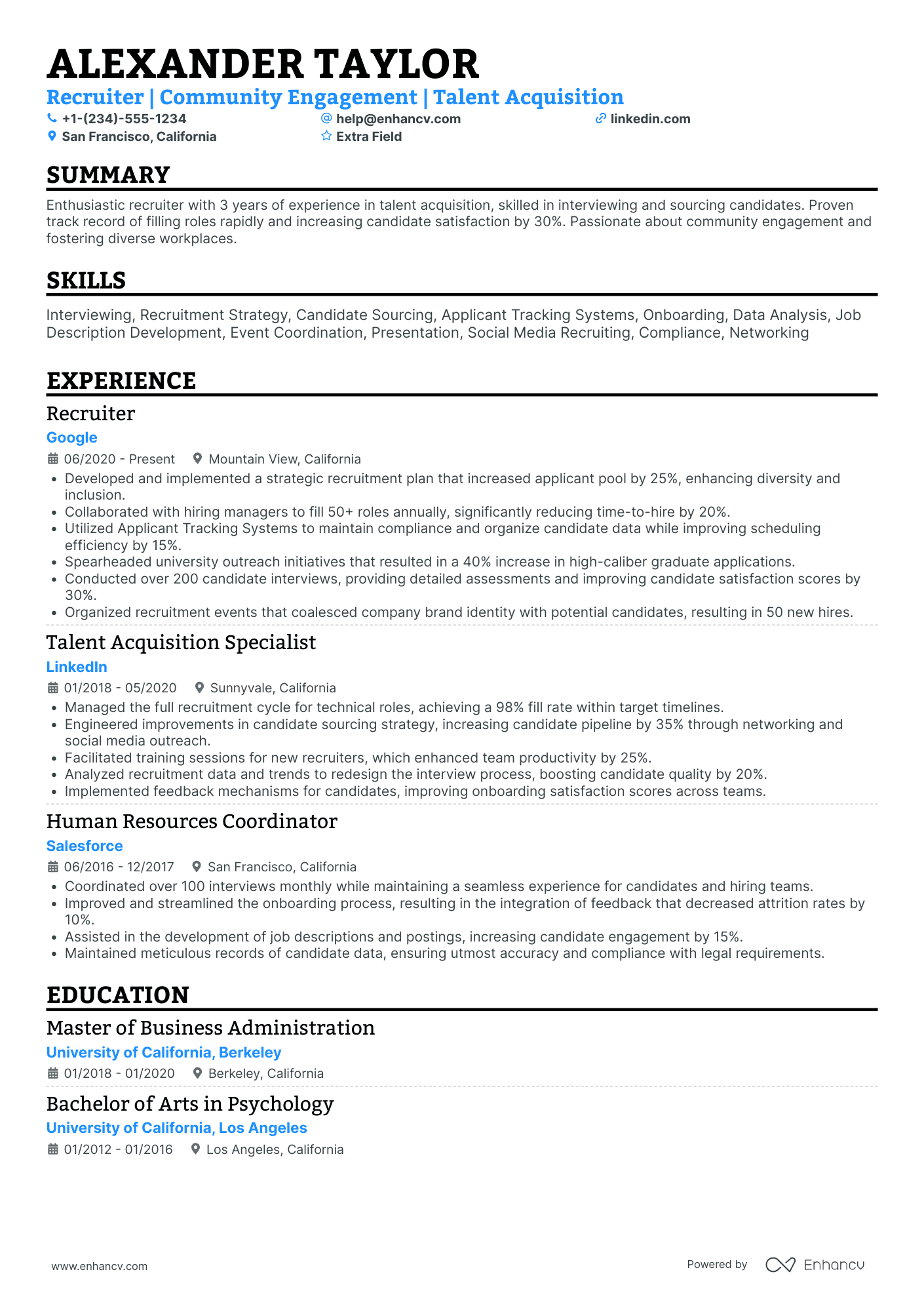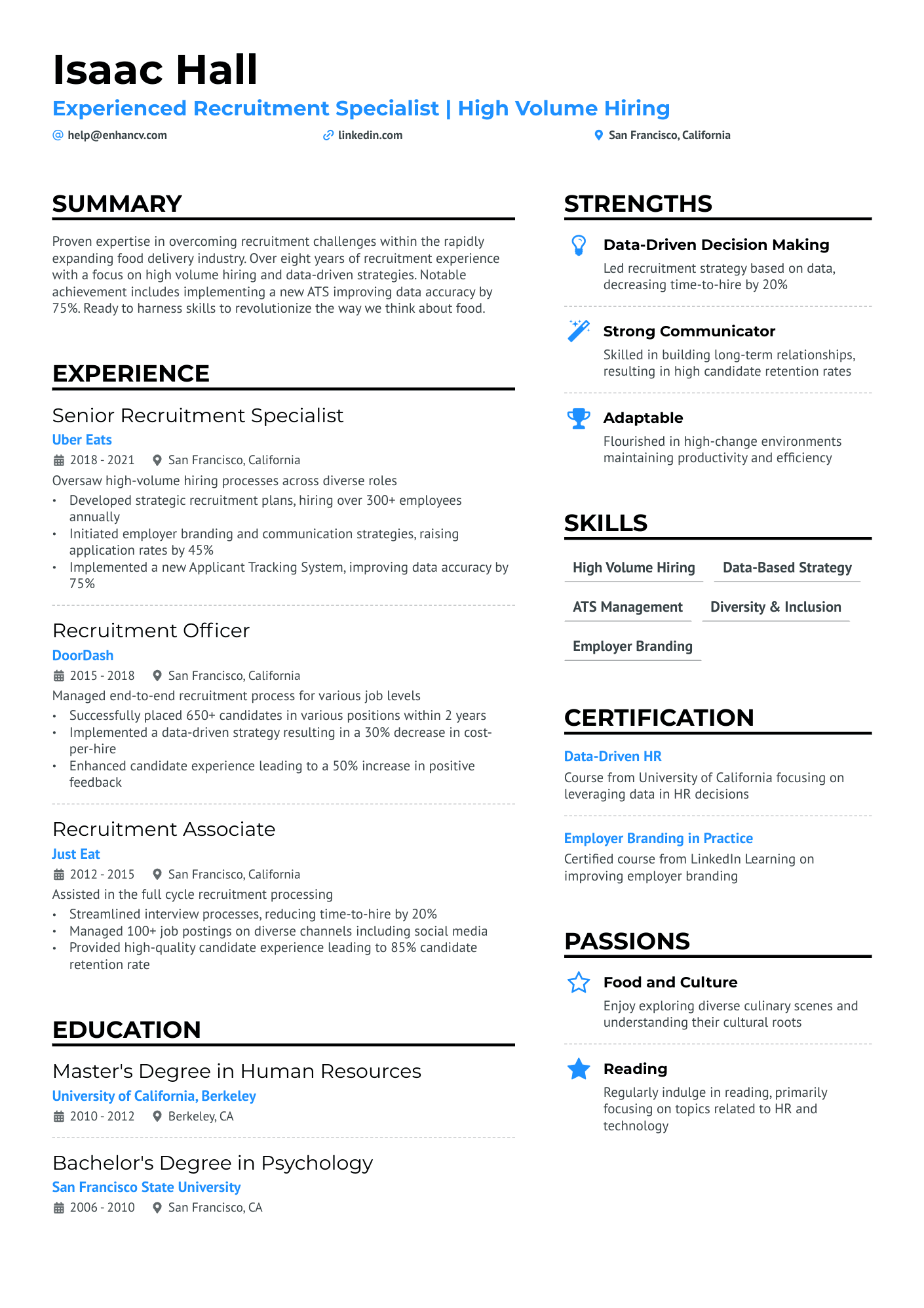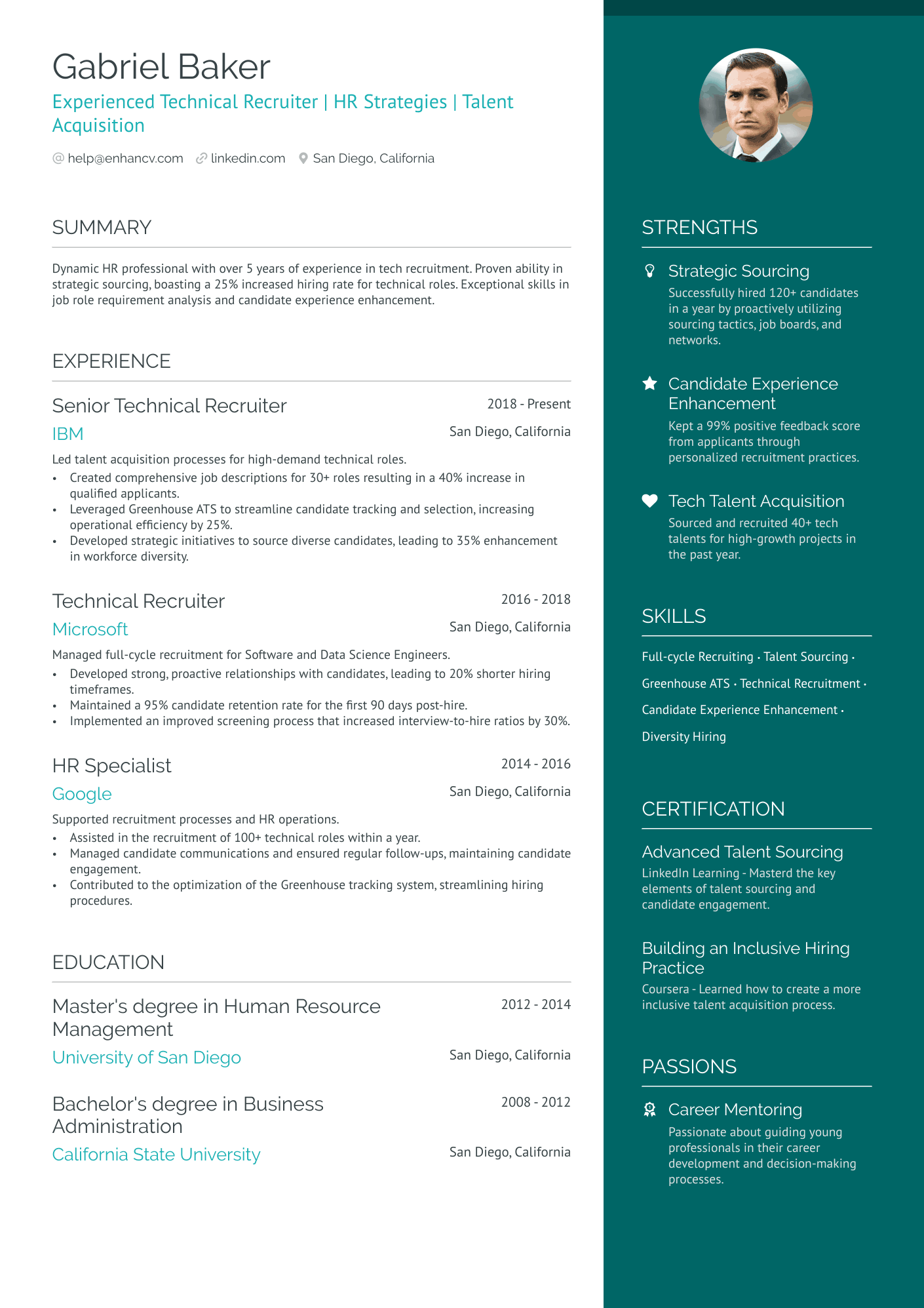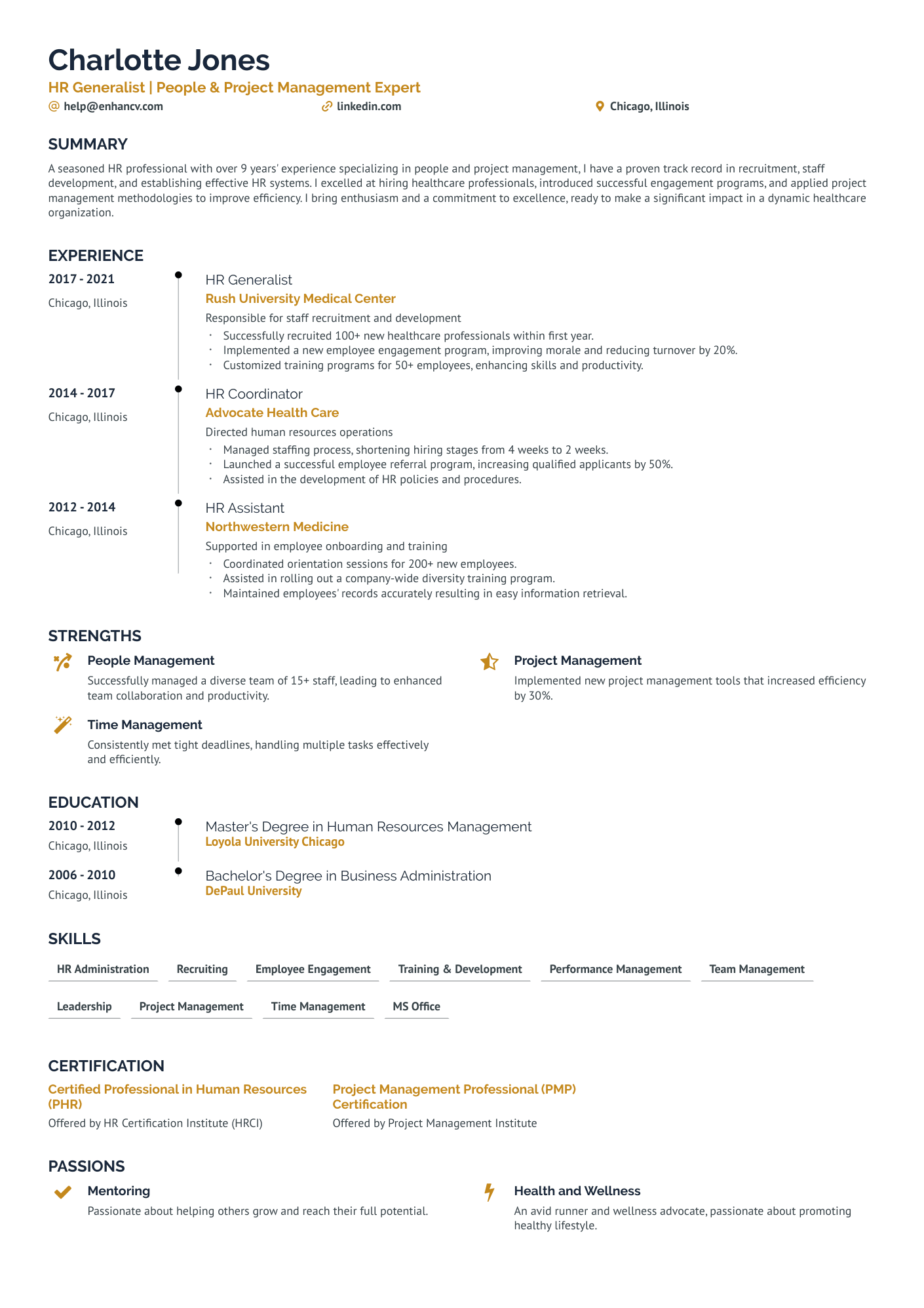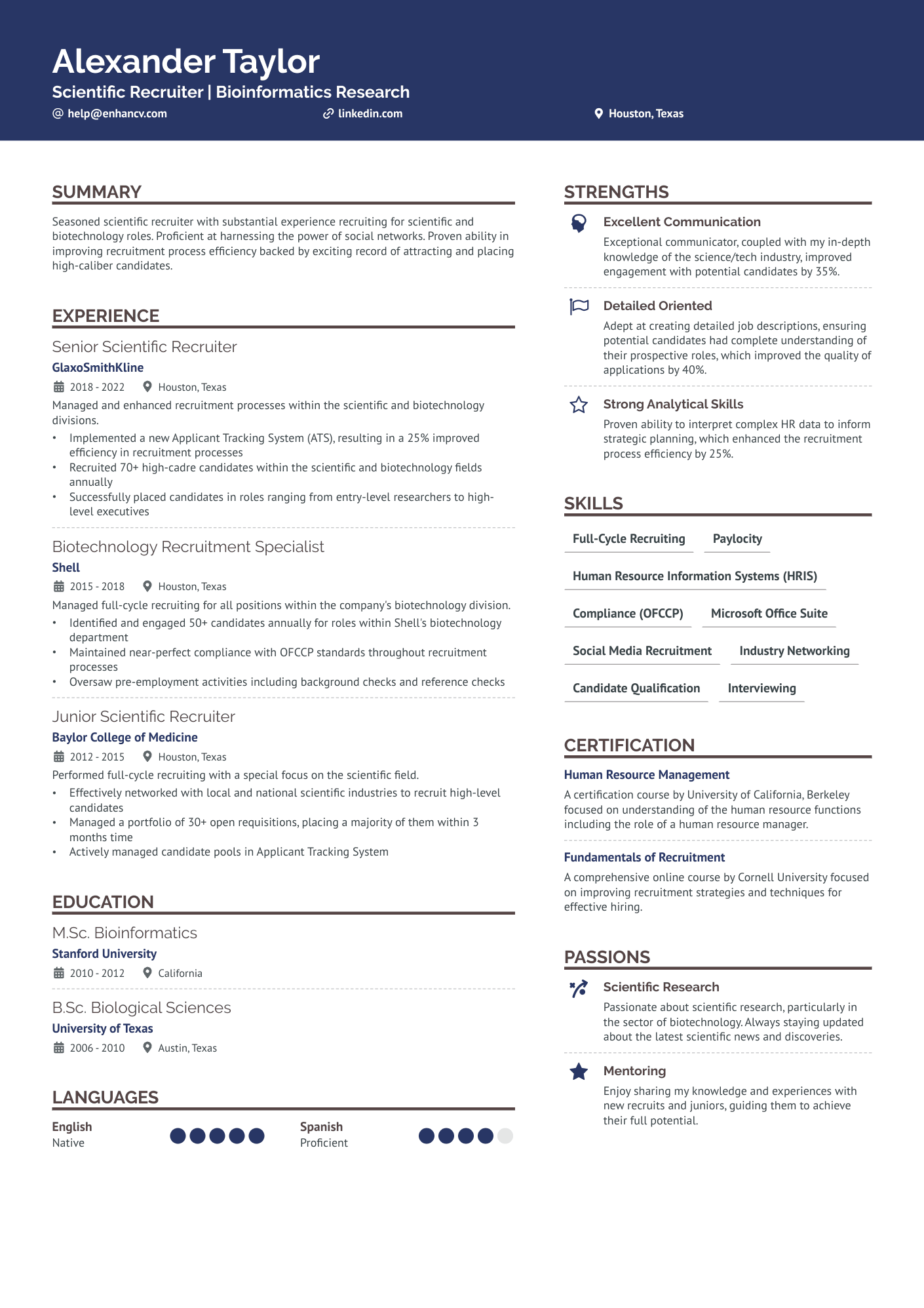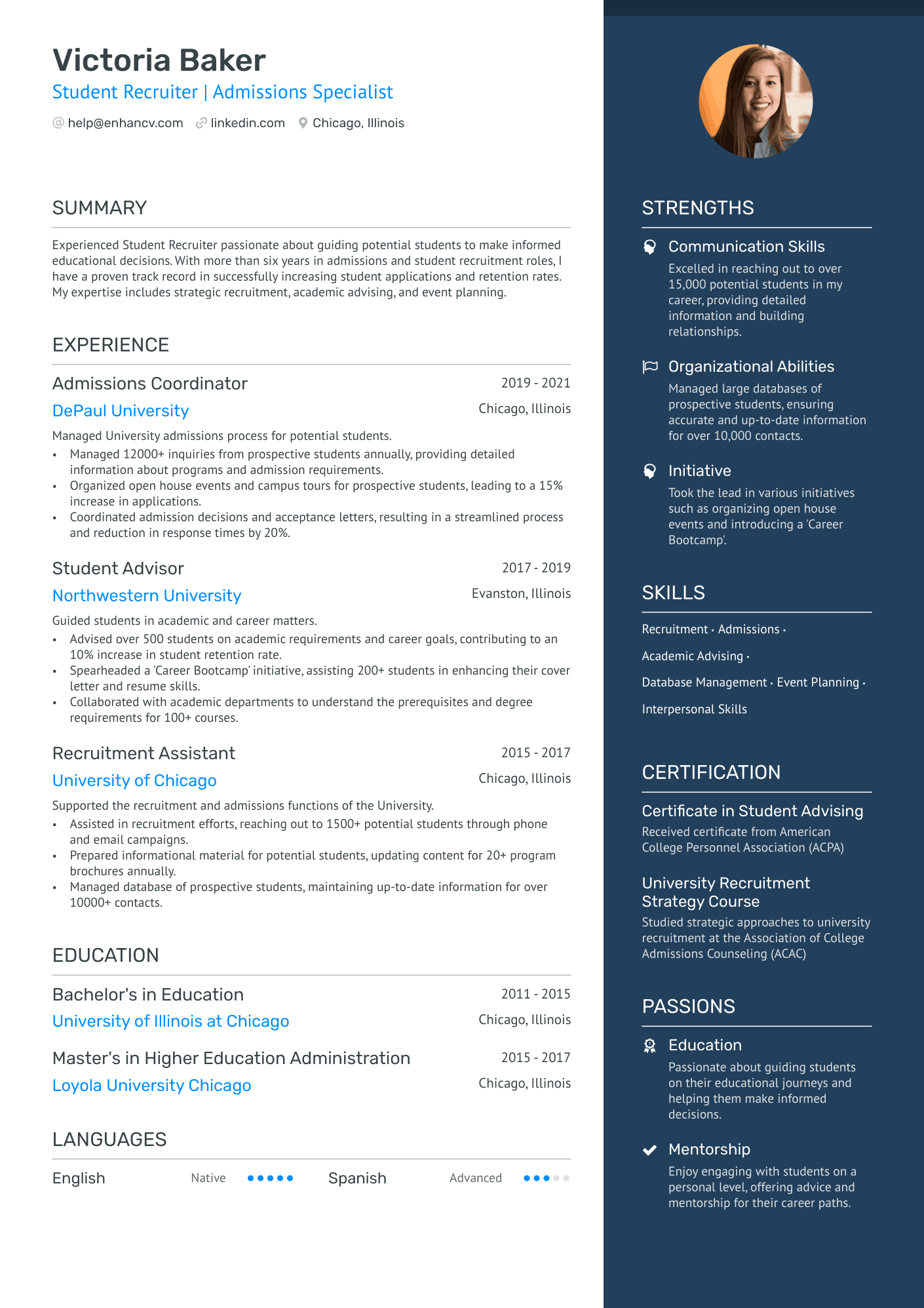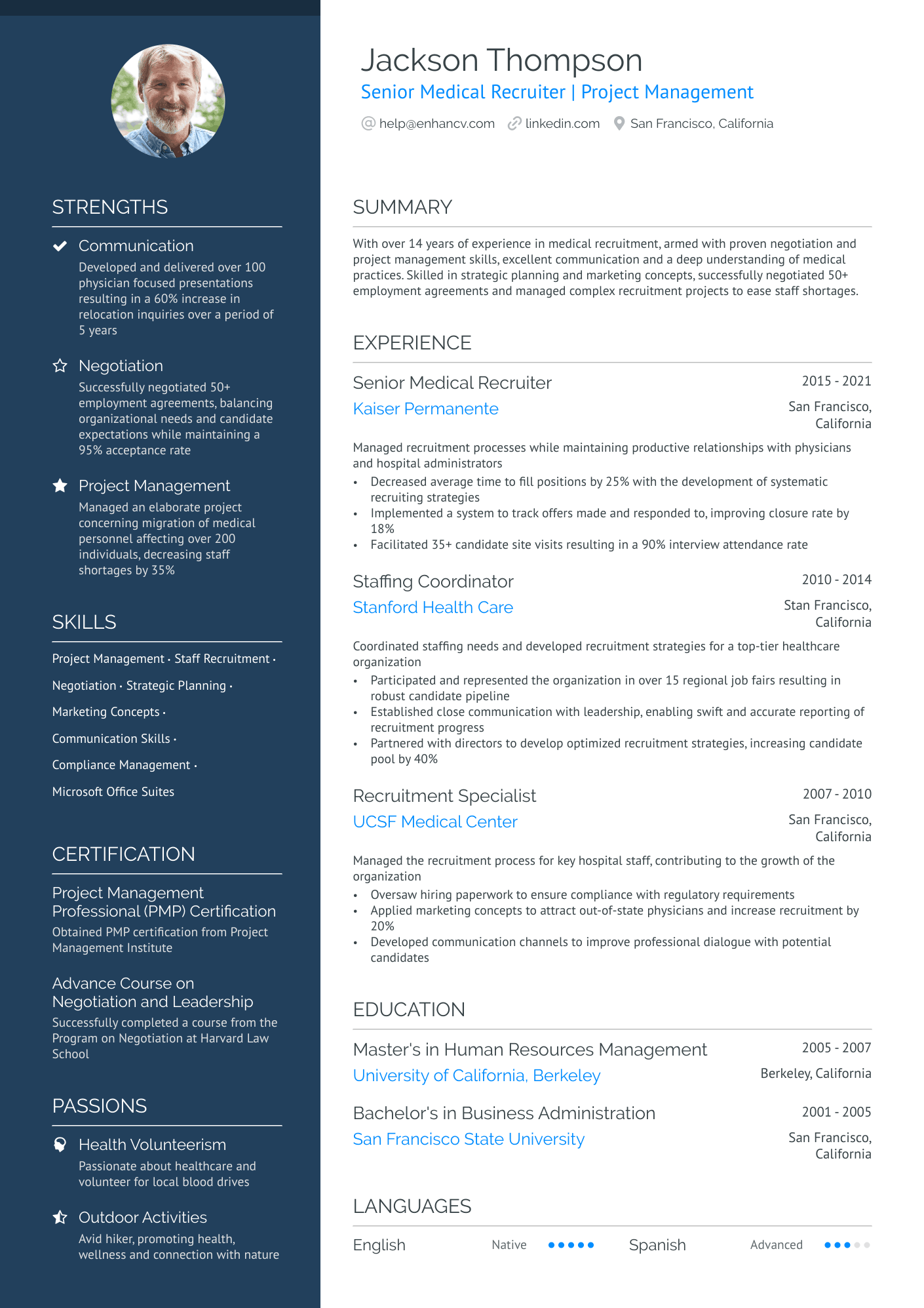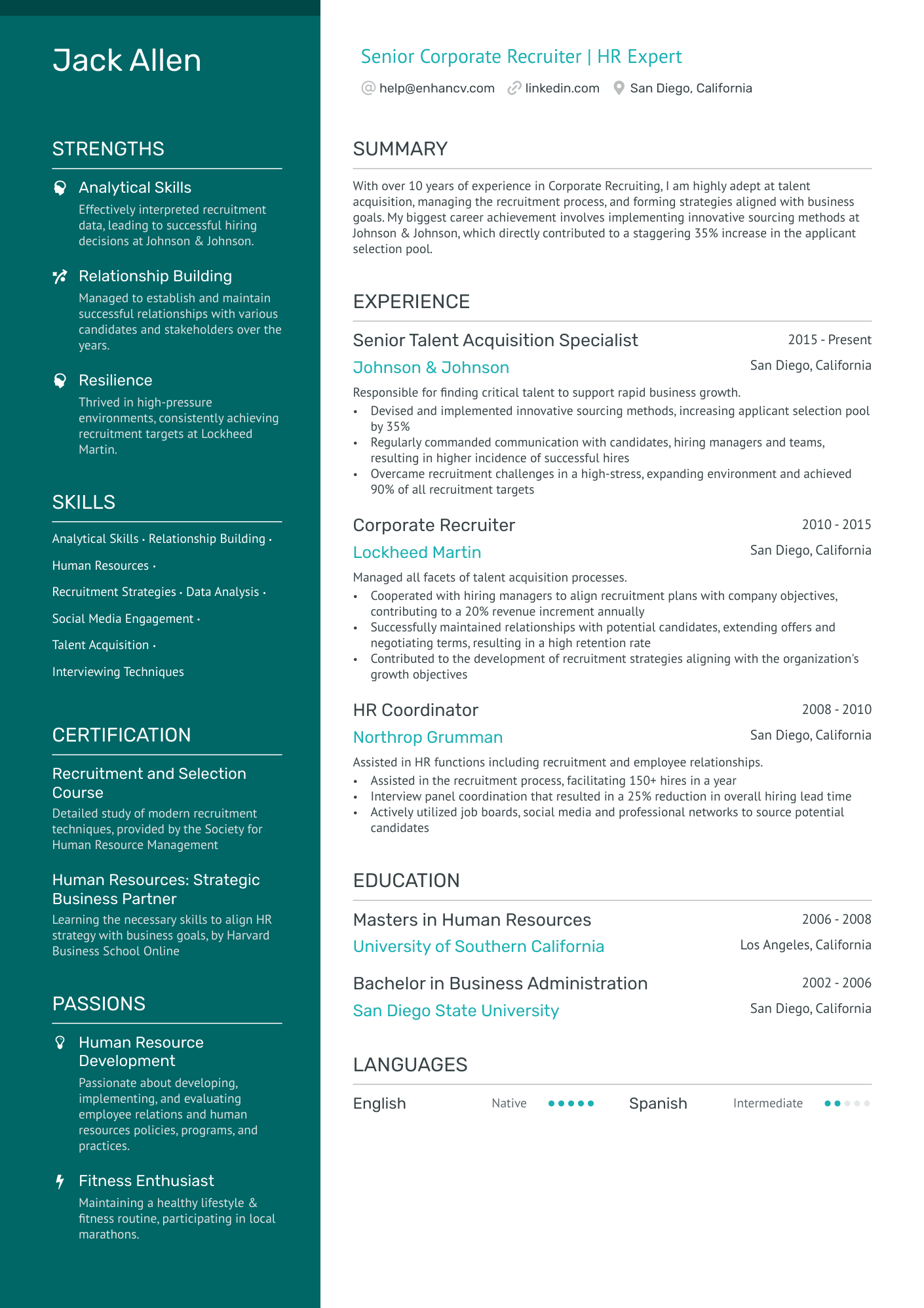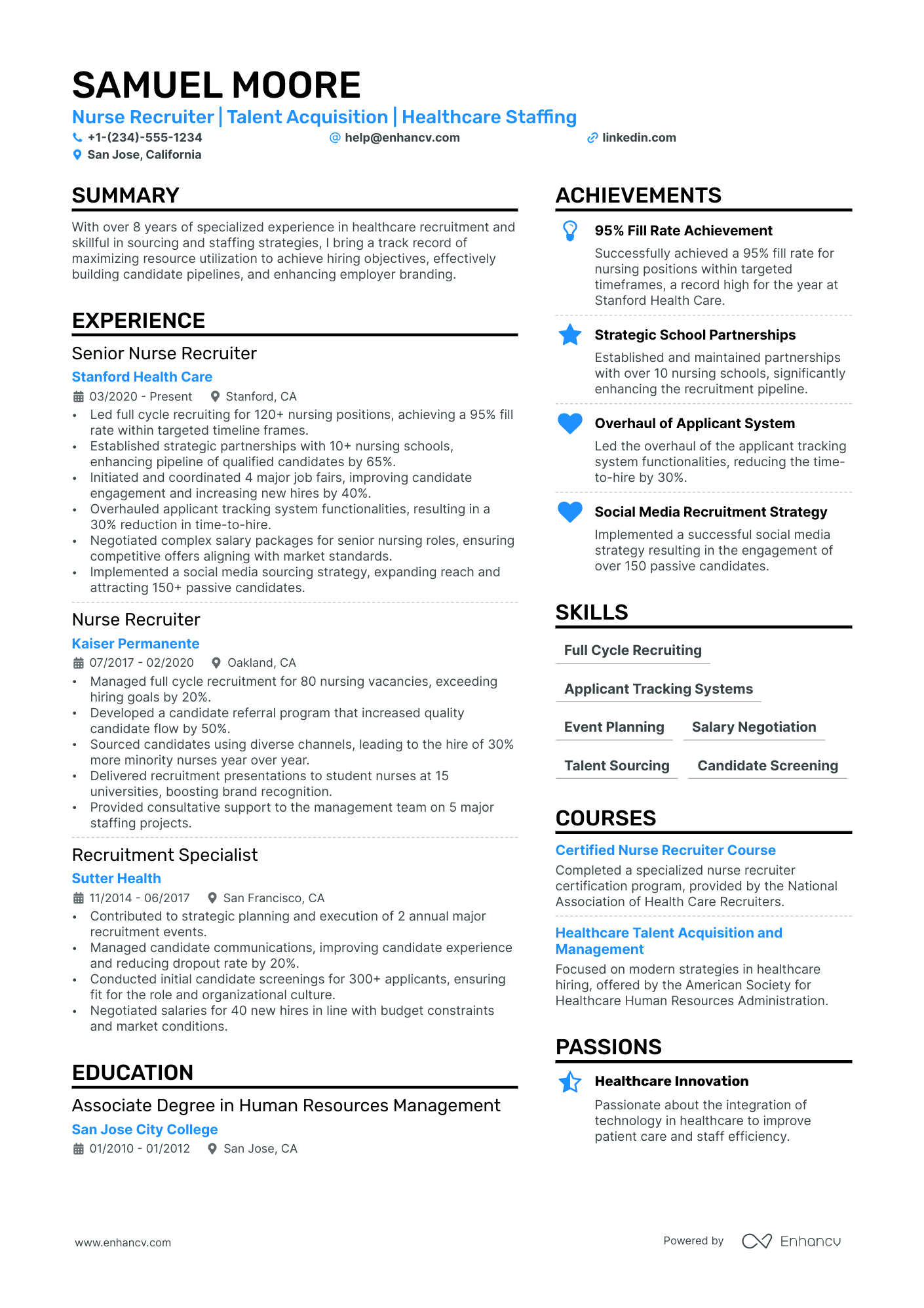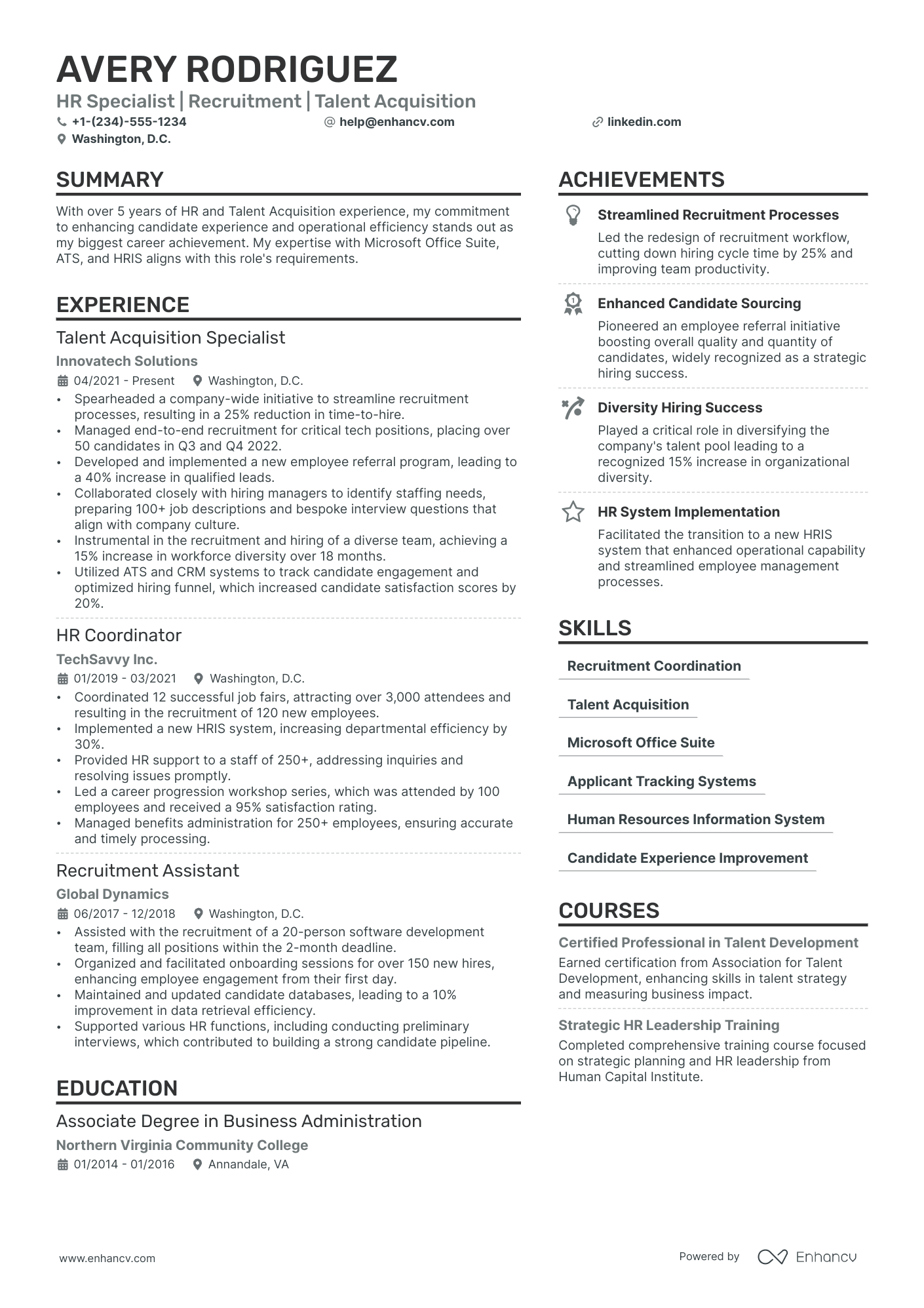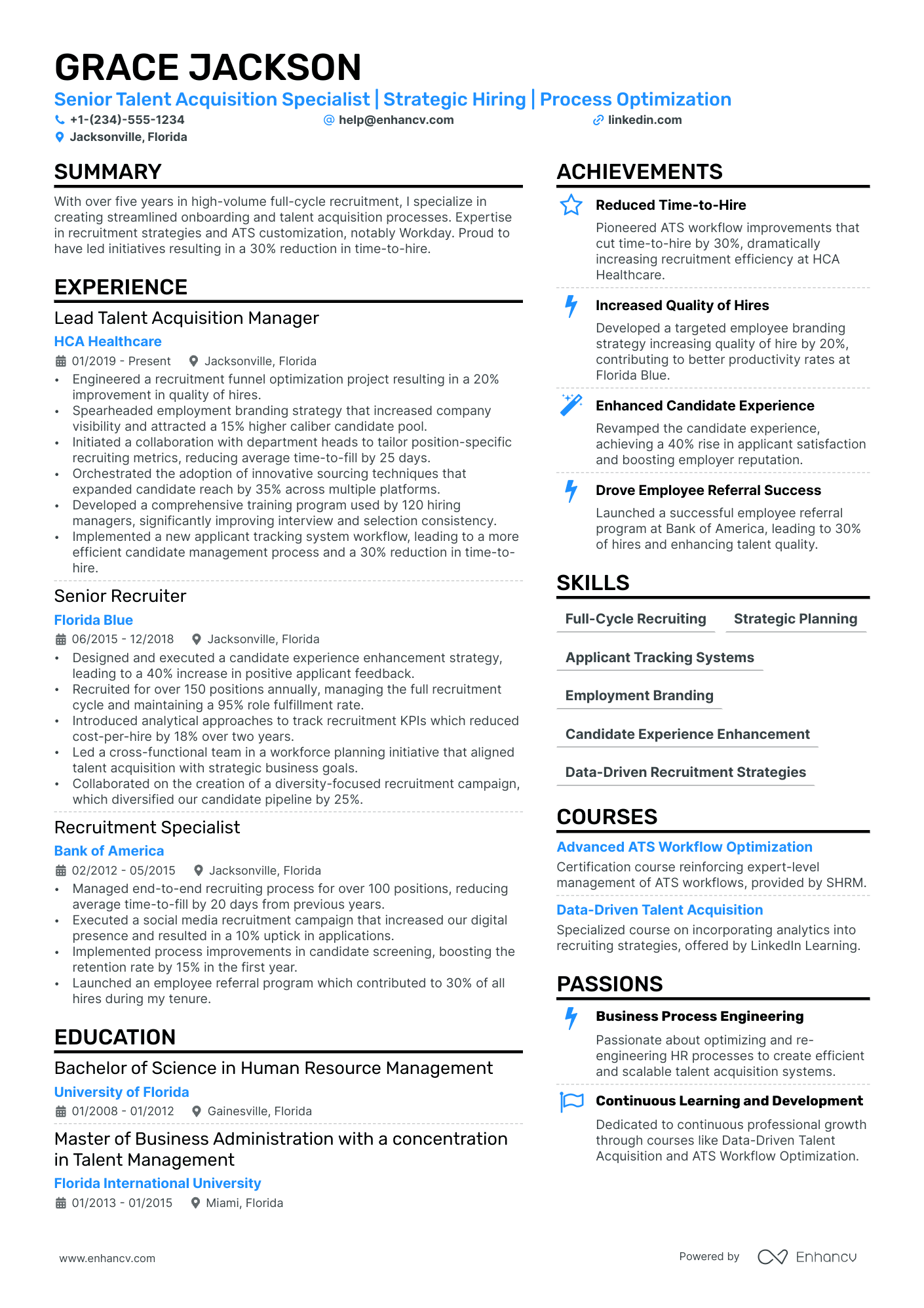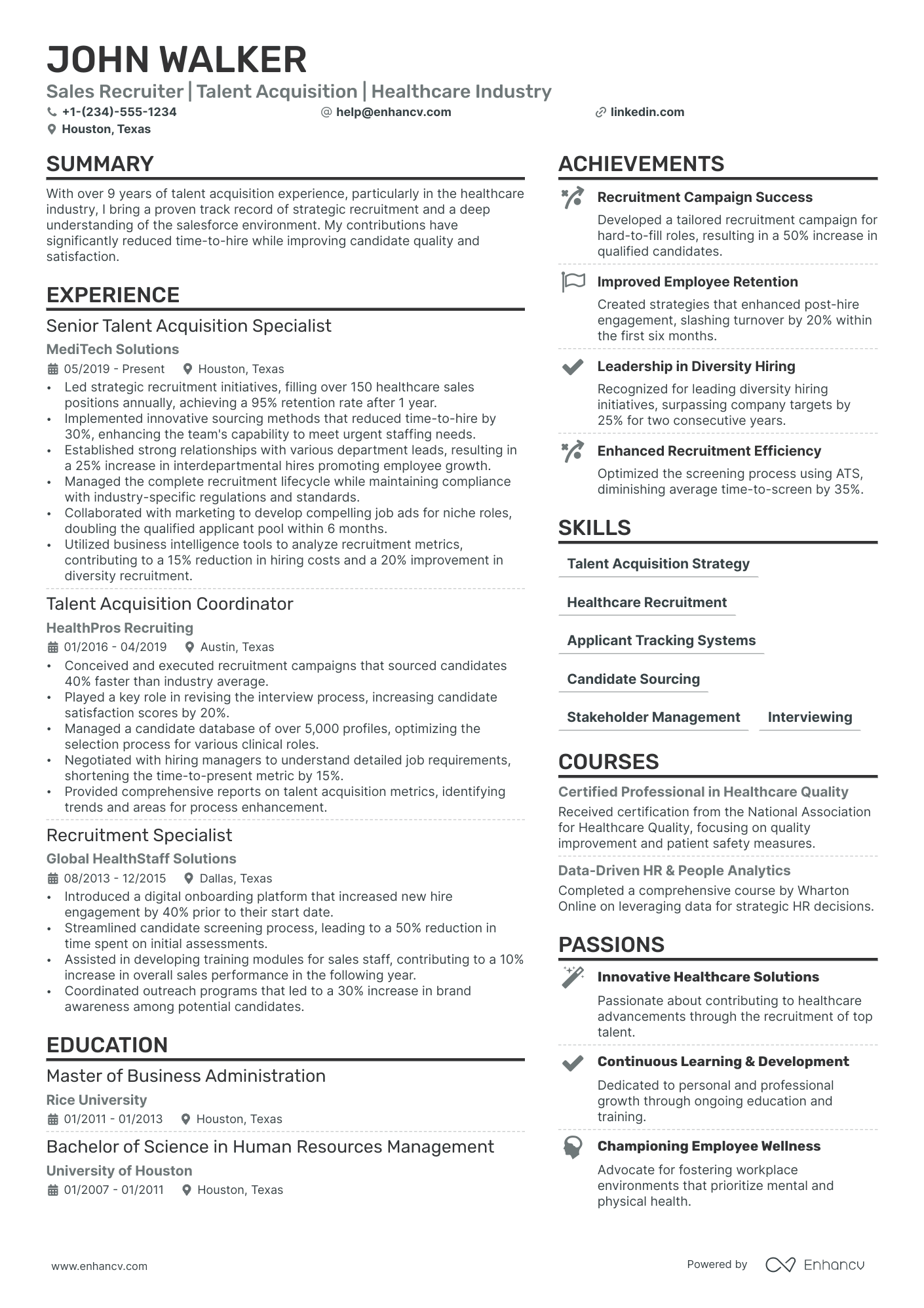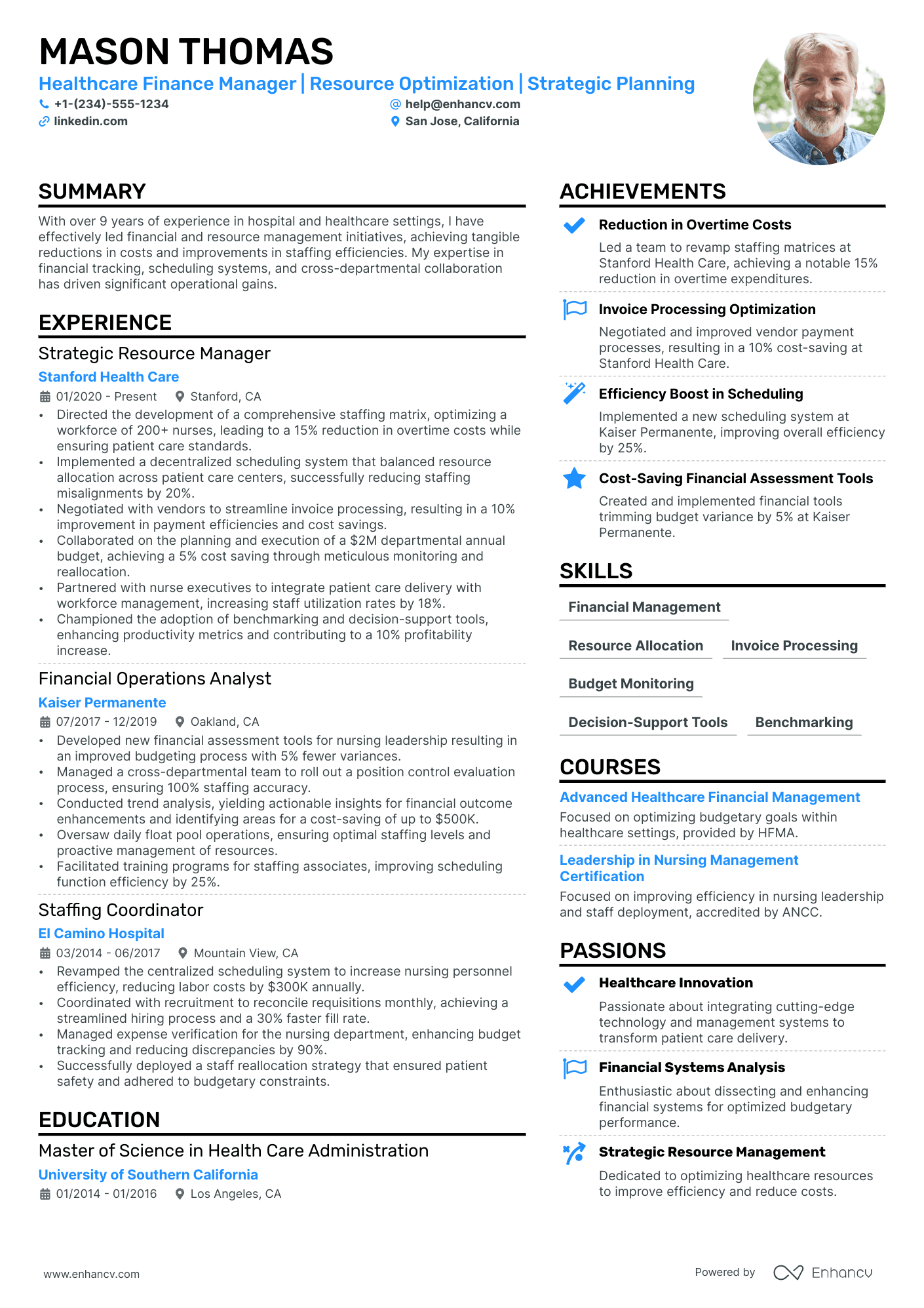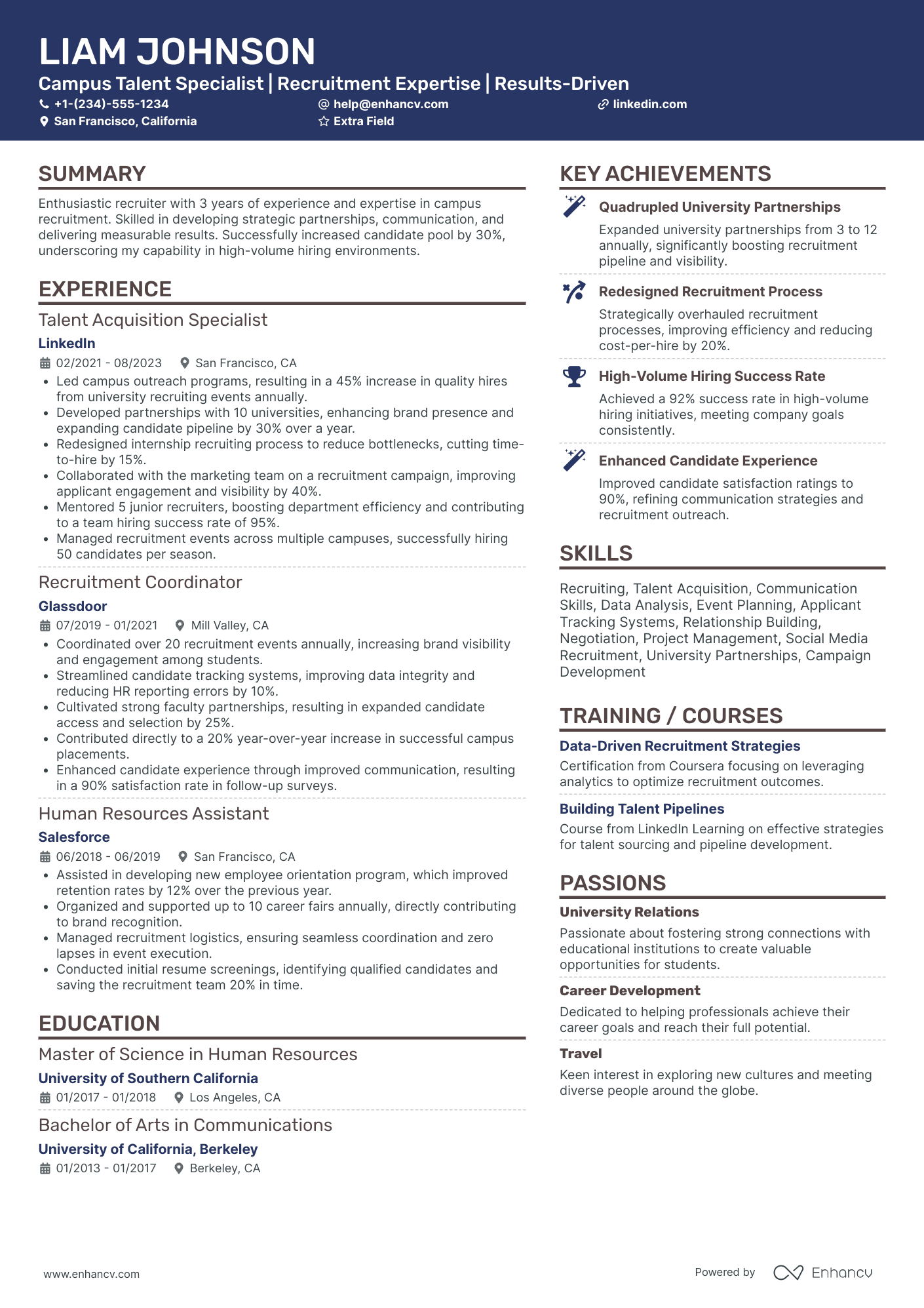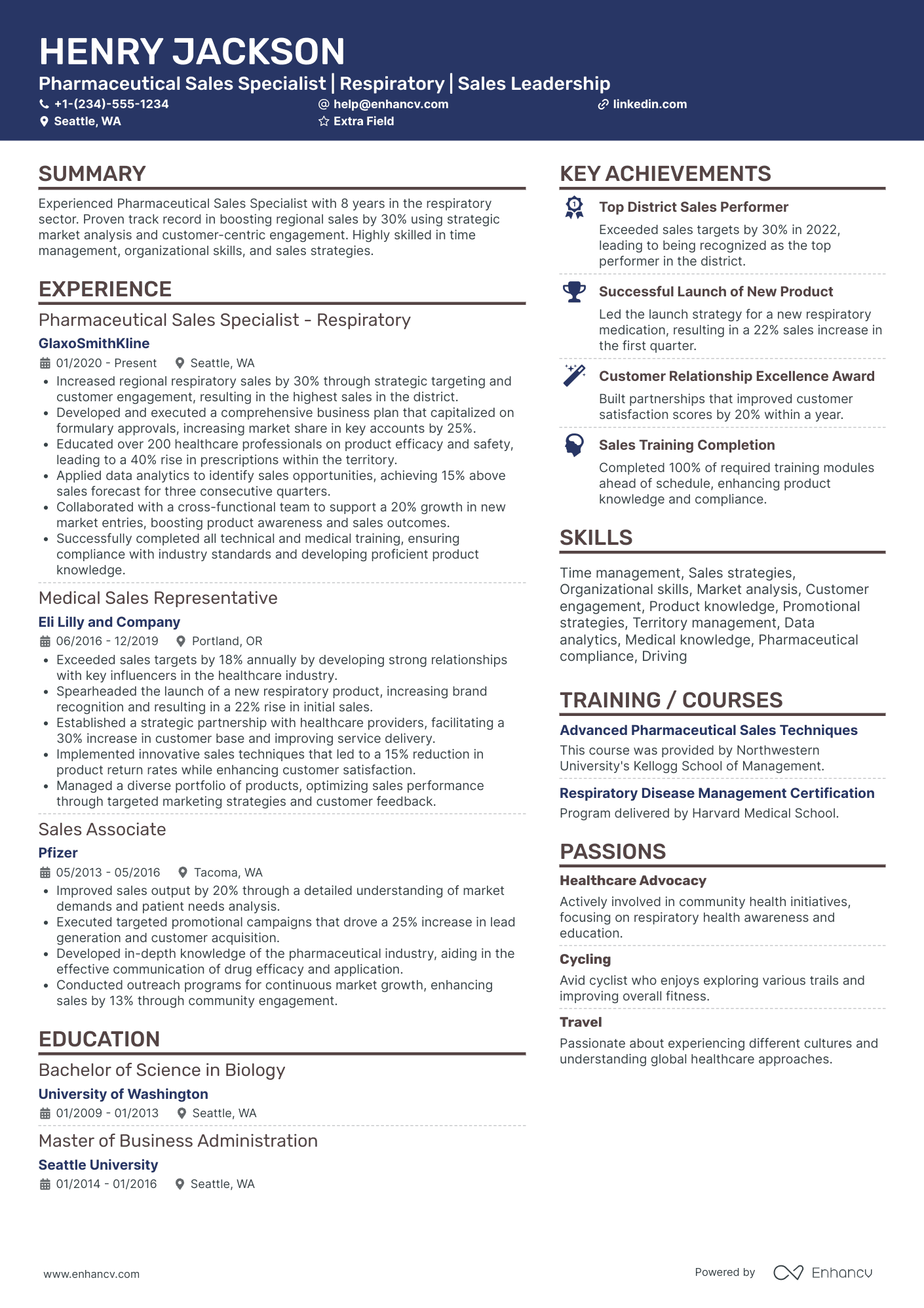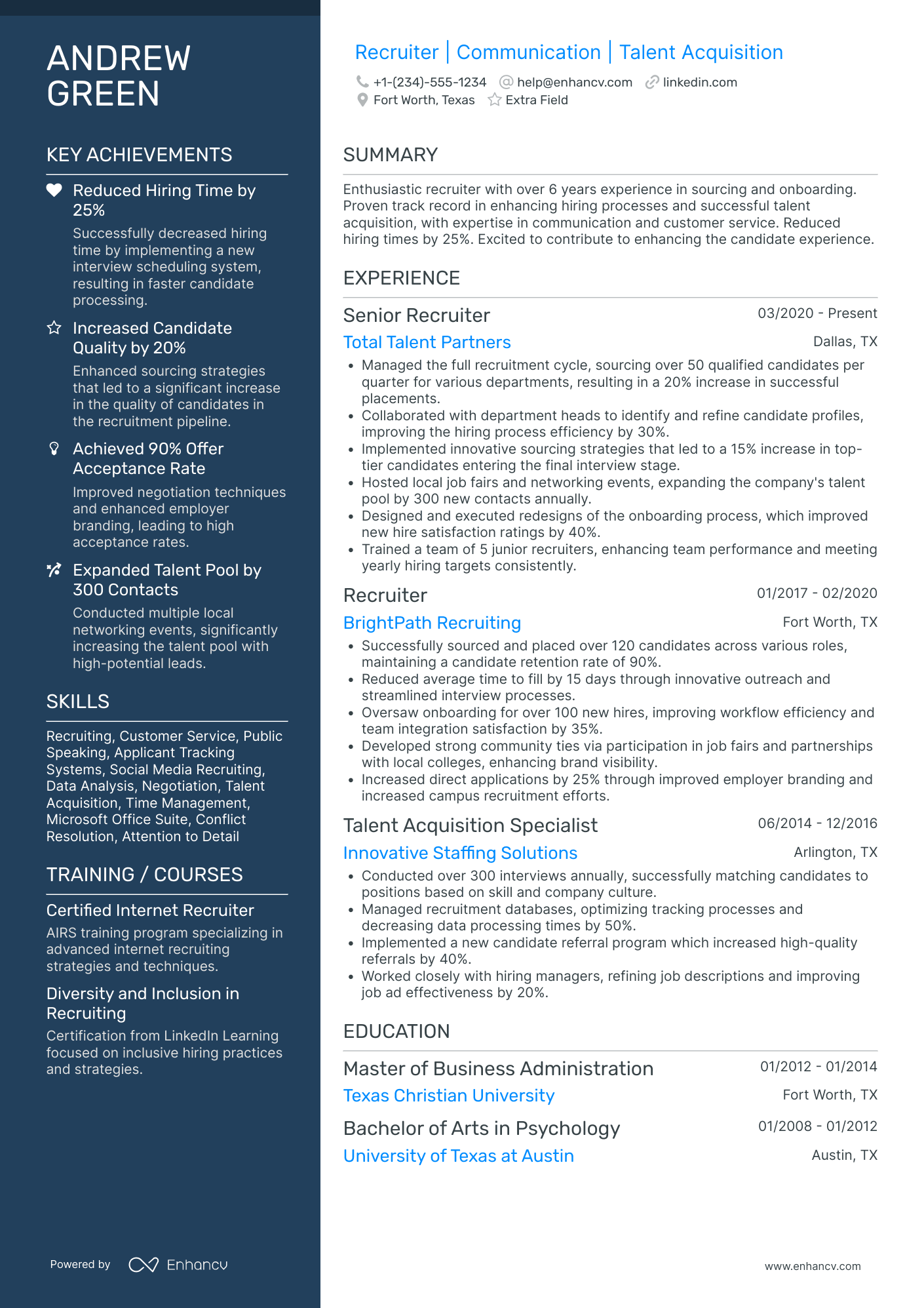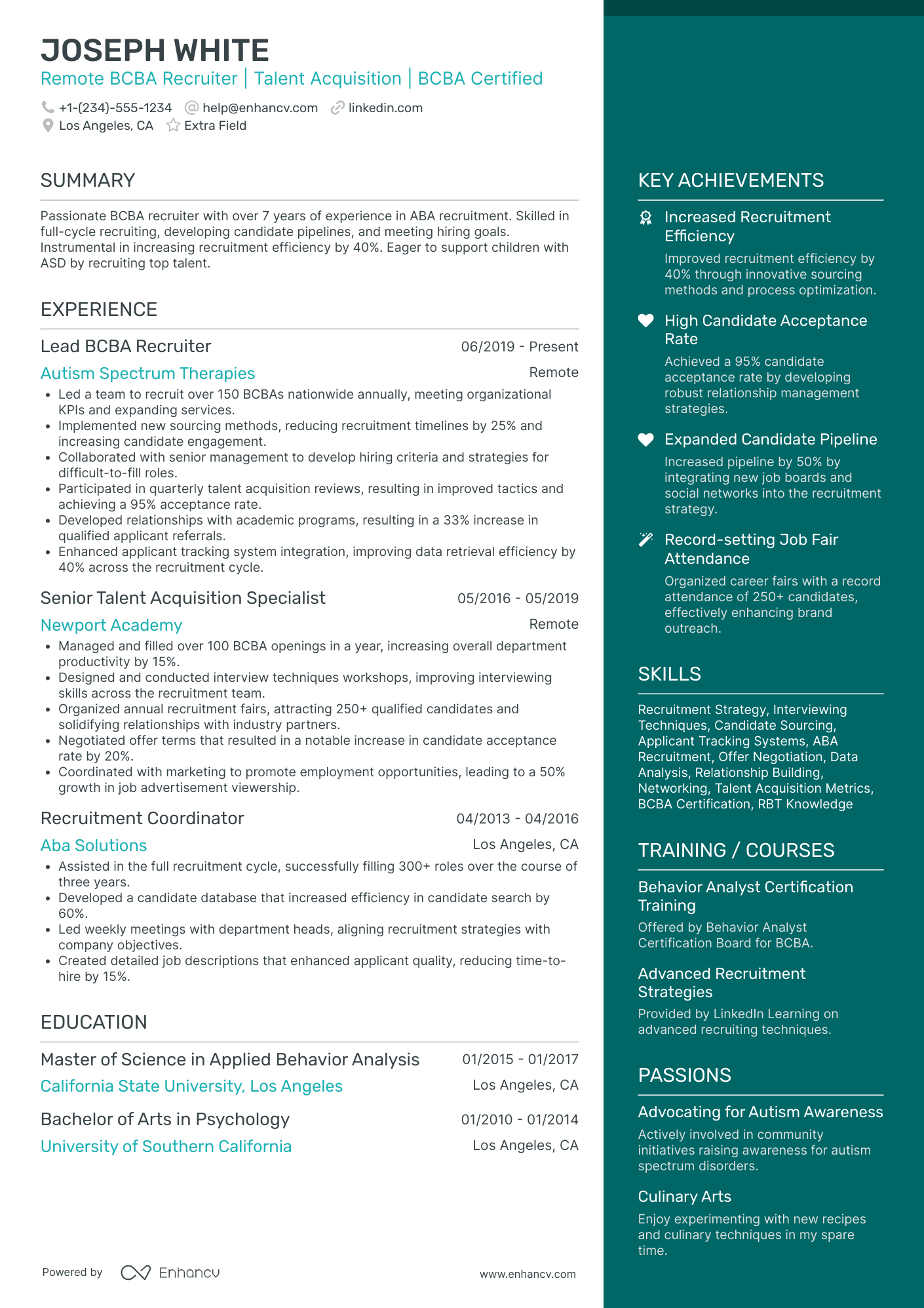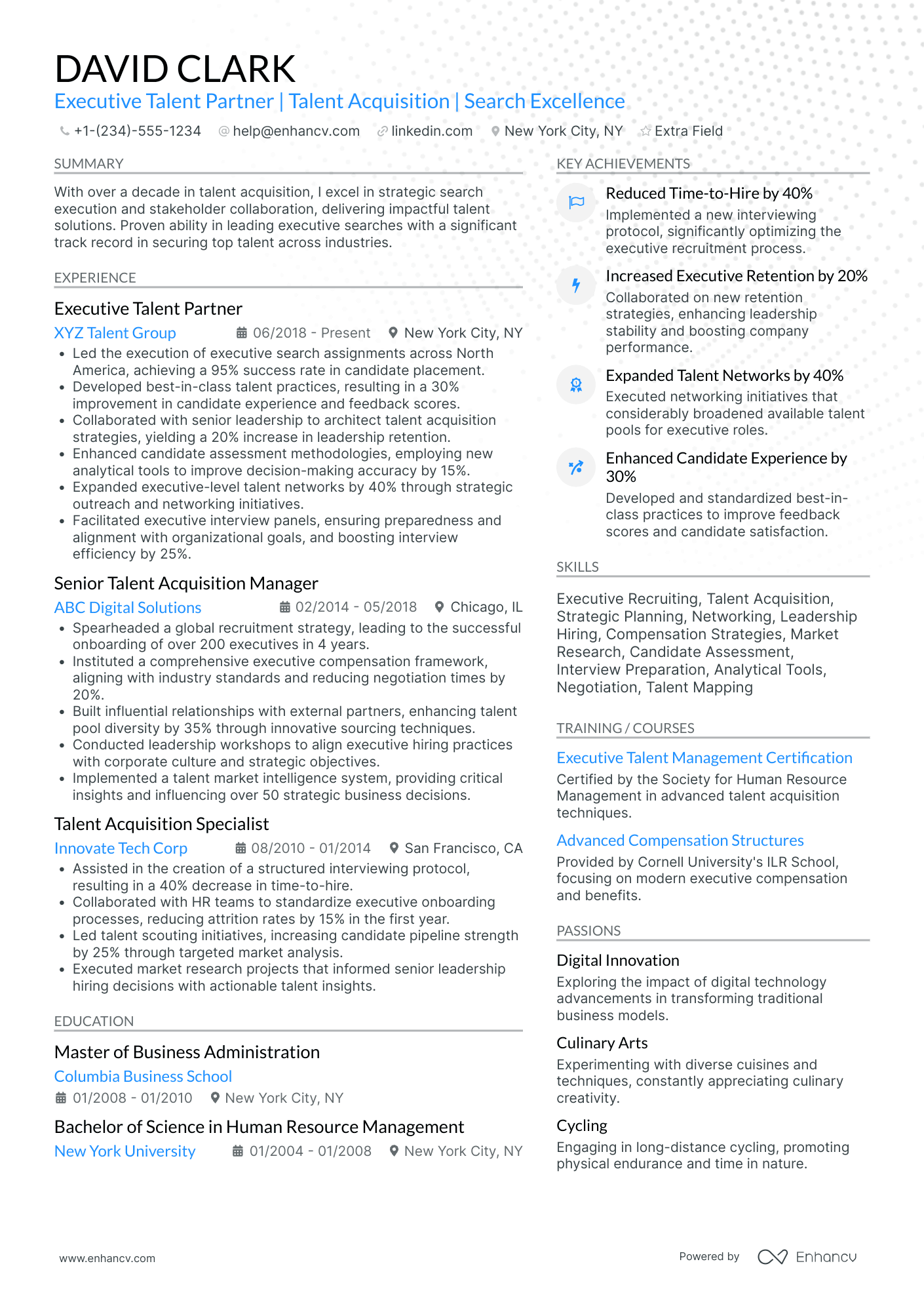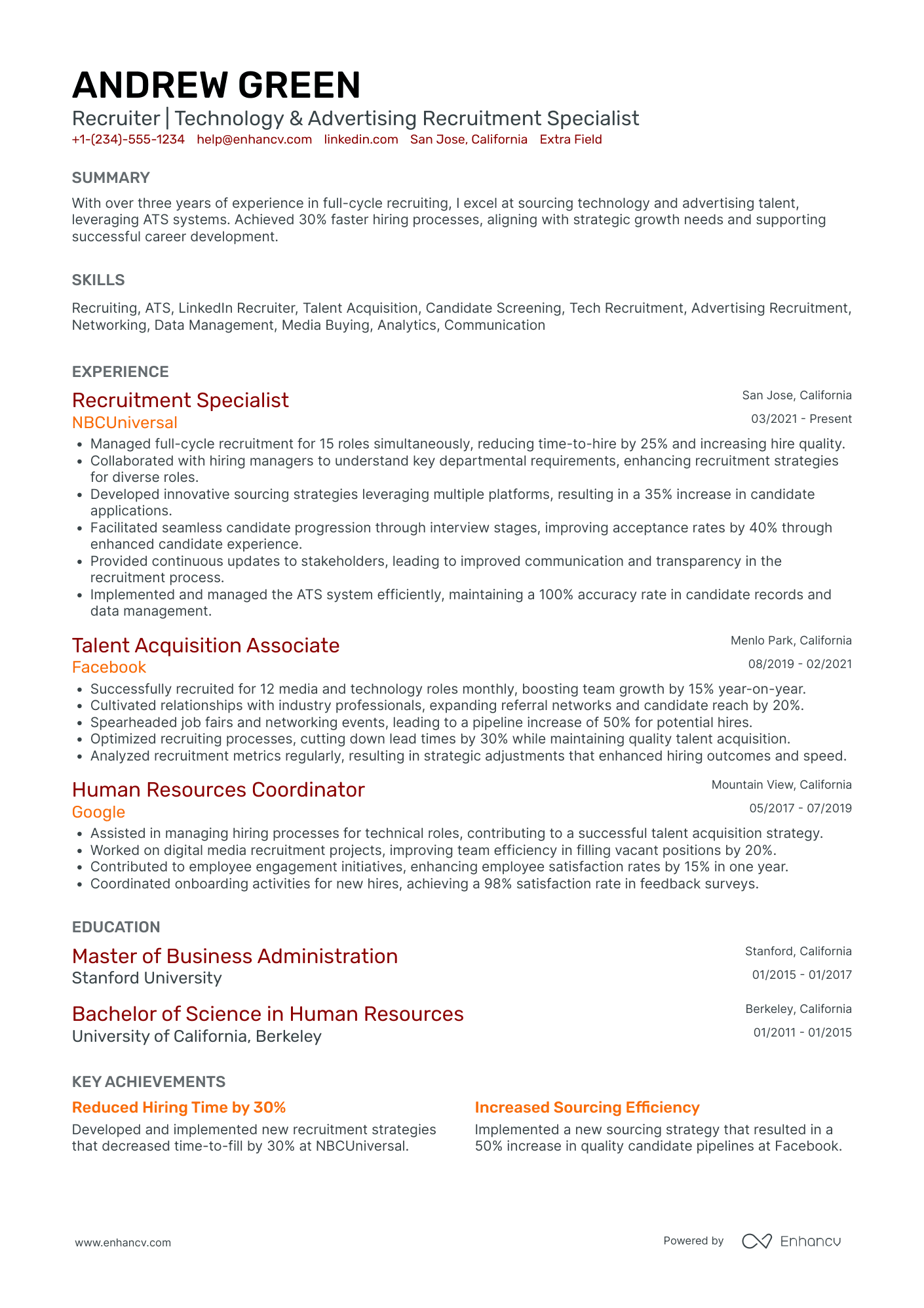Ever felt like everybody thinks they can do your job better than you? Some people think that's true, but your experience shows otherwise. Recruitment is difficult for various reasons: first and foremost, it takes a lot of analysis and insight to find the right candidate for a position. Balancing expectations between employers and candidates is a constant challenge. You need to juggle knowledge from different industries and sift through numerous resumes to find authentic ones. Sometimes, people blame you if they don’t get a job, and understanding human dynamics is crucial because people are unpredictable.
Human resources are like natural resources; they're often buried deep. You have to go looking for them; they're not just lying around on the surface.
Ken Robinson
Despite these challenges, you get to deliver the happy news when someone lands a job. That’s rewarding, right? Our recruiter resume guide explores all the important aspects to help you create a resume targeting this complex role.
Key takeaways
- The reverse-chronological format offers a detailed snapshot of your recruitment career trajectory.
- Using a sleek design with a touch of color and a standout font can really make your recruiter resume pop to potential employers.
- Highlight your experience section with quantifiable achievements and tangible results to instantly engage hiring managers.
- Include a separate section for your hard recruitment skills, and weave your soft skills throughout your resume.
- A relevant educational background is beneficial in recruitment and will always be valued.
Let's start by outlining the main principles for successful resume formatting.
Recruiter resume sample
Adapt this sample recruiter resume to your needs, or have your own done within minutes, using the Enhancv resume builder.
Henry Jackson
recruiter / HR Sourcing Specialist
henry.jackson@email.com | LinkedIn | Indianapolis, Indiana
Summary
Results-driven recruiter with over 5 years of experience in talent acquisition and HR sourcing. Proven track record in identifying and securing top talent for diverse industries. Skilled in candidate screening, conducting interviews, and managing hiring processes to ensure the best fit for organizational needs.
Experience
recruiter
Cummins Inc., Indianapolis, IN
January 2020 – Present
- Conducted thorough research to identify potential candidates and invited them to apply for open roles.
- Screened candidates through detailed phone interviews, assessing their qualifications and cultural fit.
- Managed the entire hiring process from initial contact to final paperwork completion, ensuring a seamless experience for candidates.
HR Sourcing Specialist
Eli Lilly and Company, Indianapolis, IN
March 2016 – December 2019
- Developed and implemented sourcing strategies to attract quality candidates for various positions.
- Maintained a robust pipeline of potential candidates through networking and leveraging social media platforms.
- Coordinated with hiring managers to understand job requirements and ensure alignment with candidate profiles.
Education
Bachelor of Science in Human Resources Management
Indiana University Bloomington, Bloomington, IN
Graduated: 2015
Certifications
- Professional in Human Resources (PHR)
- Certified Talent Acquisition Specialist (CTAS)
Skills
- Talent Acquisition
- Candidate Screening
- Interviewing
- Onboarding
- HR Policies
- Sourcing Strategies
- Communication
- Networking
Languages
- English (Native)
- Spanish (Fluent)
How to format a recruiter resume
As a recruiter, you recognize the importance of the right resume format. You know exactly how little time recruiters have to look at applications, and how crucial it is for them to see someone put the effort into making their resume easily scannable. So, do what you’d like to see, following these helpful tips.
Resume format
Use the timeless classic — the reverse-chronological format, because you know it works. It tells the story of your professional journey starting with the most recent experience.
Resume designs
- For a recruiter position, keep your resume concise with a one-page format to provide a clear overview of your achievements.
- Maintain a 1-inch margin on all sides. We recommend you never go with <0.5, as you’ll compromise readability.
- Utilizing a two-column layout can help you save space and present your information clearly.
- Incorporating a subtle touch of color can highlight important details without compromising professionalism.
- Modern classics like Rubik, Calibri, or Bitter are excellent font choices for a recruiter role, projecting a professional and approachable image.
Contact information
Manage this section like a pro: your resume header should state your contact information, such as name, job title, email, and phone number. A LinkedIn profile is also a great idea. Photos can be a cause for bias, so omit them unless the job posting specifies otherwise.
Think about the location of your application – Canadian resumes, for instance, might follow a different structure.
PRO TIP
We’re sure you’re aware of how ATS works, but in case you want to freshen up your knowledge, keep reading. Our tests showed that fonts, colors, columns, and resume length don’t affect ATS (Applicant Tracking Systems) parsing. Focus on matching job description language and formatting details like dates and bullet symbols as those may affect your application.
File formatting
Name your resume in a way you’d like to receive resumes as a recruiter. The most popular naming convention follows this model: FirstName_LastName_JobTitle. Oh, and – we’re sure you know this, but we’ve got to mention it — a PDF format will keep your resume layout intact.
Top sections on a resume
Your HR resume would be incomplete without these sections:
- Work experience
- Key skills
- Education and qualifications
- Professional profile
- Additional sections such as achievements or projects
More details about each section follow.
Also, you can always try our Enhancv resume builder! It’s quick and easy to use and provides everything needed for a successful application.
Is your resume good enough?
Drop your resume here or choose a file. PDF & DOCX only. Max 2MB file size.
Now that you have your resume format perfected, let's delve into the crucial details of showcasing your experience effectively.
How to write your recruiter resume experience
Your resume experience should highlight specific responsibilities and skills demonstrating your effectiveness in talent acquisition. Naturally, hiring managers will know exactly what to include on your resume to succeed. So why not use their advice? Here are some tips from a real-life recruiter’s checklist:
In your experience section:
- Is all of the personal information clearly stated at the top? I.e.: name (first and last), location, email address, phone number.
- Is work experience clearly stated with the job title, company name, and start/end dates?
- Are there any obvious spelling errors & is the formatting consistent throughout the resume?
- Are there any gaps in your employment? If so, expect to be asked about it.
You need to be strategic about framing the content of your resume experience. This involves carefully selecting keywords from the job description, assessing which requirements you can match, and incorporating those exact words into your resume. This approach is called a targeted resume, and we’ll show you how to craft yours by looking at a real-world job posting for a video editor.
Tailor your resume to the job description
Tailoring your resume to the job description is the optimal strategy when applying for any job. Opt for keywords from the job ad to catch the recruiters’ attention in an instant and prove you’re a great fit. Recruiters want to make sure your experience is relevant to what they’re looking for. Let’s see how that’s done. Check out this real-life senior recruiter job description.
Senior recruiter
Responsibilities
- Own the full-cycle recruiting process A-Z: Manage all recruiting efforts for critical reqs; from sourcing, to interview management, to the close - with an emphasis on strong hiring manager partnership and effective candidate advocacy
- Be an ambassador for Giga Energy. You will share the Giga Energy story, culture, and vision with prospective candidates and build our employer brand
- Talent Sourcing: You will constantly be on the lookout for creative ways of discovering new talent in our industry, including job boards, social media, networking events, and industry-specific sources, to identify and engage with potential candidates.
- Stakeholder Management: Partner with hiring managers and leadership to understand their unique hiring needs, develop job descriptions, and create comprehensive recruitment plans.
- Data Management: Maintain accurate and up-to-date candidate records in Greenhouse (ATS) and generate regular recruitment reports.
- Deliver an awesome candidate experience: We move fast here at Giga Energy and you'll be delivering the end-to-end experience for our candidates, from application, video screening, in-person interviews, and offers.
Requirements
- Startup or 'First-in recruiter' experience: you have ideally been the first/sole recruiter for a company, or have worked at a high-growth startup Strong eye for talent and an excellent ability to connect candidates with the right opportunities
- You enjoy sourcing passive candidates and have practical experience in sourcing candidates using a variety of strategies and platforms
- Highly self-motivated and driven to get things done
- Ability to thrive in a fast-paced, high-growth environment
- Proficiency with Applicant Tracking Systems (ATS) and recruitment software
Now here’s an experience section tailored to this exact posting:
- •Owned the full-cycle recruiting process for critical roles, managing everything from sourcing to interviewing and closing, ensuring strong partnerships with hiring managers, successfully filling over 150 positions.
- •Acted as an ambassador for Energize Solutions, promoting the company's story, culture, and vision to prospective candidates, significantly enhancing the employer brand and increasing candidate pipeline by 35%.
- •Developed and implemented creative talent sourcing strategies, utilizing job boards, social media, networking events, and industry-specific sources to identify and engage top talent, resulting in a 40% increase in candidate quality.
- •Spearheaded recruitment efforts for a rapidly growing startup, effectively managing the entire recruitment lifecycle and meeting aggressive hiring targets, hiring over 120 employees within 3 years.
- •Partnered with leadership to develop job descriptions and comprehensive recruitment plans tailored to the company's needs, ensuring alignment with business goals, which reduced time-to-hire by 25%.
- •Maintained accurate candidate records in the ATS (Greenhouse) and generated regular recruitment reports, providing insights for continuous improvement, which led to a 20% increase in recruitment efficiency.
And here’s why it’s a good fit:
- Alignment with job requirements: The experience section captures the candidate's full-cycle recruiting capabilities, strong hiring manager partnerships, and creative talent sourcing. This directly reflects the key responsibilities listed in the job posting.
- Use of relevant tools and techniques: The experience mentions the use of Greenhouse ATS and recruitment reporting, demonstrating the candidate's technical proficiency and alignment with the requirement for ATS familiarity.
- Highlighting relevant experience: The concise and engaging bullets underline the candidate's startup and high-growth company experience, fulfilling the requirement for candidates who have worked in fast-paced environments and have 'First-in recruiter' experience.
After describing your experience, the next step is to make these accomplishments tangible to emphasize your impact and clearly showcase your value.
How to quantify your experience on a resume
Quantified experience is memorable. We’re not saying you should flood your resume with numbers – if you don’t explain the “science” behind them, they’re no good. Potential employers are interested in the impact of your achievements, not meaningless metrics.
Quantify your experience like a pro with these examples
- Instead of merely stating that you handle talent acquisition, express the average number of days you take to fill a position.
- If your interventions improved employee retention, quantify this impact with percentages.
- Mention if your hires often outperform benchmarks, using facts and figures to back up this claim.
- Your success can be quantified through the number of hires, or percentage increase in hires year on year.
- If your negotiating skills or aptitude for finding talent have resulted in economic gains for the company, state how much the company saved, detailing the situation.
Don’t have a strategy for your entry-level recruiter resume? We’ve got you!
How do i write a recruiter resume with no experience
A lack of experience can be daunting, but everybody’s got to start somewhere. There are ways to make your resume appealing, even if you don’t have much experience. Here are some tips:
- Choose the functional resume format to focus on your skills rather than your experience. Perfect for entry-level candidates.
- Showcase any projects where you developed transferable skills like communication, organization, and attention to detail.
- If you’re certified or trained in HR software or Microsoft Office, include that in your resume.
- A modern resume template will make you look professional and up-to-date with the latest trends in recruitment.
- Speak any foreign languages? That’s always a plus on a recruiter resume, as you’ll meet people with different backgrounds.
- Relevant extracurricular activities such as joining a human resources club, or volunteer work as an HR assistant for charitable organizations are excellent ways to gain relevant experience.
Resume objective
Your first job resume will make an impression with a well-written resume objective. Make sure it includes:
- Up to 3 sentences emphasizing your goals and aspirations.
- A quick overview of your skills and achievements.
- A clear statement on what you bring to the company.
Here’s a well-written resume objective example:
Here’s why it works:
- Relevant to a recruiter role: The objective directly mentions sourcing and screening top talent, managing the hiring process, and providing progress updates, which are all key responsibilities in the job description.
- Emphasis on key skills and requirements: The objective highlights excellent organizational and communication skills, proficiency with LinkedIn recruiter, and a commitment to an inclusive and equitable hiring process, aligning with the requirements listed in the job description.
- Demonstrates motivation: By mentioning a strong passion for recruitment and talent acquisition, the objective reflects the candidate's motivation and enthusiasm, making them a suitable fit for an entry-level recruiter position.
While your experience demonstrates what you have accomplished, your skills underscore the specific abilities you bring to potential employers.
Recruiter resume skills
Your skills section is a powerful representation of what you can do. Use it to provide clear examples to hiring managers.
Divide your skills into hard and soft. Hard skills refer to the industry-specific competencies you’ve got, such as HR software. Dedicate a separate section to them to make them easily scannable.
PRO TIP
Remember: these can be measured and tested, so don’t lie on your resume.
Take your pick from these top hard skills for recruiters:
Best hard skills for your recruiter resume
- Applicant Tracking Software (ATS)
- Human Resources Information Software (HRIS)
- Talent Management Systems
- Recruitment Marketing Platforms
- Interview and Assessment Tools
- LinkedIn recruiter
- Microsoft Office Suite
- X-Ray Search
- Social Media Sourcing
- Boolean Search
- Resume Databases
- Online Job Boards
- Google Suite
- Multi-channel Posting Software
- Vendor Management Systems
- Onboarding Software
- HR Analytics Tools
- Recruitment Automation Tools
- Database Management
- Customer Relationship Management (CRM) Software
Soft skills build strong relationships with both candidates and HRs and allow you to navigate complex interpersonal dynamics and resolve conflicts. Instead of listing them in a separate section, which won’t mean anything to the recruiter, incorporate them with examples throughout your resume. Choose from this list:
Best soft skills for your recruiter resume
- Communication
- Listening
- Negotiation
- Problem-solving
- Decision-making
- Multitasking
- Time management
- Adaptability
- Organizational
- Relationship building
- Empathy
- Patience
- Persistence
- Ethical judgment
- Self-motivation
- Conflict resolution
- Attention to detail
- Cultural awareness
- Proactivity
- Resilience
With a clear understanding of essential skills, let’s now focus on presenting educational qualifications effectively on a resume.
How to list your certifications and education on your resume
Even if it’s not absolutely necessary for a job in HR, we can’t imagine a situation where higher education wouldn’t be a plus. So, if you’ve got a degree in human resources or similar, list it on your resume. In a competitive field like recruitment, it gives you that extra oomph. Here are our tips:
- Clearly state your degree and major (e.g., a BA in Human Resources Management or Psychology).
- List your educational institution to highlight the credibility of your education.
- Specify the year you graduated to provide context and the recentness of your education. Skip the month.
- Mention courses related to recruitment and human resources, such as Talent Acquisition, Organizational Behavior, or HR Management.
- If you’ve been on the Dean's List, graduated Cum Laude, or received a scholarship, point it out in your application.
This education entry targets the job description we looked at earlier:
- •Relevant coursework: Talent Acquisition, Organizational Behavior, Employment Law, HR Analytics
- •Member of the Society for Human Resource Management (SHRM) student chapter
- •Completed internship with a focus on recruitment and onboarding processes
It works because it includes:
- Relevant coursework and activities: The entry includes specific coursework and activities (e.g., Talent Acquisition, SHRM membership) that directly relate to the role of a recruiter, showcasing the candidate's focused education and engagement in their field.
- High GPA: Displaying a high GPA (3.8 out of 4.0) demonstrates academic excellence and a strong understanding of the subject matter, which can be appealing to potential employers.
- Practical experience: Mentioning the internship with a focus on recruitment and onboarding processes provides evidence of practical, hands-on experience, which is valuable for a recruiter role, especially in a fast-paced, high-growth environment.
Training and certifications are an additional way to become an expert in the recruitment industry. A certifications section provides objective proof you’re not just going through the motions, but dedicating time to become a pro in your field. You can include one of the certificates we’ve listed below, but best check with your desired job ad.
Best certifications for your recruiter resume
With your educational background clearly outlined, let's now focus on crafting a compelling resume summary that highlights your professional experience.
How to write your recruiter resume summary
If you’re an experienced recruiter, the one checking your resume might be your match. So, they’ll know what to look for. Grab their attention fast with an engaging resume summary. Here’s what to include in it:
- 3 – 5 sentences on your best qualities and qualifications.
- Industry-specific jargon to show you know what you’re talking about – literally!
- Measurable experience that tells the story of your accomplishments.
- Relevant education or additional training that adds value.
- Most importantly, underscore what you can do for the company.
Here’s the summary we would include on a senior recruiter resume targeting the job description above.
This summary effectively aligns with the job responsibilities by highlighting full-cycle recruiting experience and talent sourcing. Work in high-growth startup environments and proficiency with ATS and recruitment software fit the fast-paced, high-growth setting described in the job ad.
With a strong summary in place, let's explore the additional sections of a resume that further underline a candidate's qualifications.
Additional sections for a recruiter resume
Additional resume sections can reveal a lot about your character and the unique skills you’ve got. Don’t miss out on this chance to impress recruiters. Here’s what you can include:
- Any accolades or awards you have received for your performance as a recruiter.
- Memberships in professional organizations like SHRM or NACE that show your commitment to the field.
- Relevant volunteer work that highlights your passion and commitment to helping others.
- Any additional languages you speak, which can be an asset in diverse recruiting environments.
- Specific recruiting projects or initiatives you have led or participated in that had a significant impact.
- Personal activities and passions outside of work that can underscore your well-rounded personality and transferable skills, such as teamwork, leadership, or creativity.
In conclusion
By following our expert tips on listing your experience, skills, education, and certifications, you'll create a compelling recruiter resume that stands out in the competitive job market. Remember, a well-crafted resume summary or objective can make a lasting impression, setting the stage for your next career opportunity.
Recruiter resume examples
By Experience
Entry-Level Recruiter
Senior Recruiter
Experienced Legal Recruiter
Senior Healthcare Recruiter
Senior Corporate Recruiter
Junior IT Recruiter
Entry-Level Tech Recruiter
By Role
